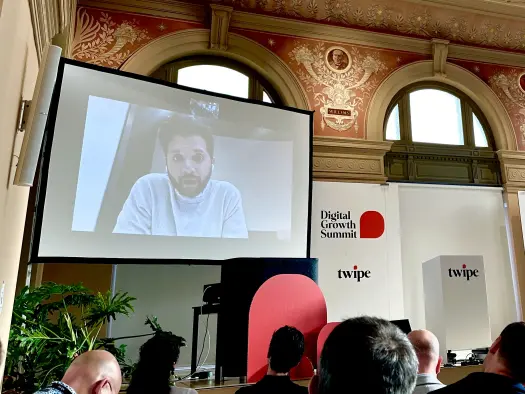
OpenAI’s head of media partnerships has said the company does not currently intend to share ad revenue from its SearchGPT product with publishers whose content it surfaces. Virtually addressing the Twipe Digital Growth Summit in Brussels on Monday, Varun Shetty said the company believed its prototype search engine, SearchGPT, will fairly compensate publishers through “significant incremental traffic from new audiences”. But he added that the matter was “an evolving space for us right now” and that it was in OpenAI’s interests to provide enough value to stop publishers opting out of appearing in SearchGPT results.
[Read more: OpenAI testing prototype search engine with news publishers ] “We think there’s an opportunity here to drive significant incremental traffic from new audiences,” Shetty said, responding to a Press Gazette question. “And then we’ll have to see if that is valuable enough to partners to remain opted-in. “This will be something that we’re thinking a lot about, but I think we’re going to start with this proposition of traffic.
” Google chief executive Sundar Pichai has made a similar claim with regard to Google ’s AI Overviews, claiming the bot-generated summaries drive healthy click-through rates despite evidence they make publishers less visible in search results . In contrast to Google and OpenAI, AI-powered search engine business Perplexity has revenue sharing agreements in place with publishers including Time and Der Spiegel , and last week Microsoft announced it will begin paying publishers whose content is surfaced by its productivity assistant Copilot . Shetty used his appearance at the conference, which was attended by delegates from publishers including Axel Springer , The Economist , Die Zeit and Denmark’s JP/Politiken Media Group , to argue that the relationship between publishers and the new tech giant should be mutually beneficial.
He said: “What we want to do is really balance the user experience of wanting to find an answer about recent events or information with the publisher need to be correctly attributed, sourced and have traffic driven back to their sites.” This compromise, he said, had informed the design of SearchGPT, which is presently in an experimental phase and only accessible to around 10,000 users in the US. Shetty said the company intended to fully fold SearchGPT into flagship product ChatGPT “by the end of the year”.
SearchGPT answers user queries in natural language, rather than with a series of links like a traditional search engine, and indicates the sources of its information with icons beneath the response. “This is the core experience that we’re building, and this is where you can see the balance that we’re trying to get right between users and publishers,” Shetty said. “If you click on the sources and more tab, you start to see a large link rail of citations and sources.
“Again, what we’re trying to do here is create as much surface area as possible for people to have an information-dense experience, but also to create opportunities for click-through.” OpenAI believes that people “aren’t satisfied with just seeing a collection of links – they actually do want an answer”, Shetty said. But he added: “We do believe that they want to go further, that they want to click through to verify what they’re seeing, that they want to click through because they’re curious and want to learn more, and that they click through because they trust the source that they’re seeing and they want to just get a deeper understanding of the information that’s being presented to them.
” ‘The burden is on us to figure out how to create enough value so you want to be part of this ecosystem’ Shetty, a former executive director of strategy and business development at The New York Times and a director of business development and product partnerships at Meta, said publishers may opt out of appearing in SearchGPT results if they wish and that they do not need to be an OpenAI partner to opt in. “We care deeply about giving publishers control over how they appear within SearchGPT, or if they appear at all. “If a publisher wants to appear within SearchGPT it just has to allow the search bot on their site .
And that search bot only allows us to display content [on SearchGPT] – it does not allow us to train on the content. “And we think that this opens up an incremental traffic opportunity for publishers without having to deal with decision-making around training or not. Again, if a publisher decides they do not want to be a part of this experience, they simply have to block the crawlers and then the burden is on us to figure out how to create enough value so you want to be part of this ecosystem.
” ‘No one wants to read AI-generated news’ Shetty also used the appearance to make his case for how OpenAI can be of use to the news industry. “No one wants to read AI-generated news”, Shetty said, “but can we make it easier for journalists to recommend stories? To find the right photos within the CMS? To create that context box that sits along the side?” Other newsroom ChatGPT uses, he suggested, included using the bot to “up-level or down-level” a piece of writing “to help reach different audiences”, to translate it or to transform it from text into audio or video. Away from the editorial side, he suggested using a chatbot to help manage customer services for subscription businesses or to power personalised content recommendations for logged-in readers.
Several publishers who have signed deals to surface their content in ChatGPT , including Time, Vox Media and The Atlantic have gained access to OpenAI products as part of their deals. Shetty claimed the next GPT model, due out in the next six months, will be powerful enough that it will be “agentic”, allowing users to set it a more complex task “as you would a high-performing employee” and have it return with an answer in a few days. The post OpenAI exec rules out sharing revenue from SearchGPT with publishers, for now appeared first on Press Gazette .
Source link.










